Welcome back to This Week in Apps, the weekly TechCrunch series that recaps the latest in mobile OS news, mobile applications and the overall app economy.
The app industry continues to grow, with a record 218 billion downloads and $143 billion in global consumer spending in 2020. Consumers last year also spent 3.5 trillion minutes using apps on Android devices alone. And in the U.S., app usage surged ahead of the time spent watching live TV. Currently, the average American watches 3.7 hours of live TV per day, but now spends four hours per day on their mobile devices.
Apps aren’t just a way to pass idle hours — they’re also a big business. In 2019, mobile-first companies had a combined $544 billion valuation, 6.5x higher than those without a mobile focus. In 2020, investors poured $73 billion in capital into mobile companies — a figure that’s up 27% year-over-year.
This Week in Apps offers a way to keep up with this fast-moving industry in one place with the latest from the world of apps, including news, updates, startup fundings, mergers and acquisitions, and suggestions about new apps and games to try, too.
Do you want This Week in Apps in your inbox every Saturday? Sign up here: techcrunch.com/newsletters
Top Stories
Apple responds to story accusing it of buying ads on Google to promote App Store apps
A story on Forbes this week alleged Apple was being sneaky by purchasing Google ads for high-profile subscription apps on the App Store in order to direct web searchers away from the developers’ websites, where users could purchase commission-free subscriptions, which would reduce Apple’s cut of App Store revenue. Some companies accused Apple of placing the ads without their consent and said Google wouldn’t allow them to be deleted.
Apple, which doesn’t typically respond to reports of this nature, this time came out swinging against these complaints.
The company said it does not buy these ads in secret, but rather has been placing ads for over five years and communicates with developers about those ads. In addition, Apple said there’s nothing nefarious about its doing so. The company explained that retailers generally do buy ads for products they sell. That is, when you search for something like a winter jacket on Google, you’ll find ads from a variety of retailers selling the coat, in addition to (or instead of) ads placed by the jacket’s manufacturer. This is how online retail works, and Apple doesn’t think its ads are any different. Apple said it currently runs ads to promote more than 100 top third-party apps across ad platforms on Google, YouTube, TikTok, Snapchat and Twitter.
Forbes’ report said impacted applications included Babbel, Bumble, HBO, MasterClass, Plenty of Fish and Tinder.
The report may have mischaracterized the situation, but it’s an incredible example of how bad the relationship has become between Apple and its developer community. In previous years, developers would have welcomed free advertising that drove new customers to their apps — now even that is considered a threat by some. Apple, however, contended the situation represented by the Forbes piece is not how most developers feel.
Spotify finally gets lyrics
Image Credits: Spotify
After years of ignoring consumer demand for in-app lyrics, particularly in the U.S., Spotify announced this week it will make a new Lyrics feature available to all global users, both Free and Premium, across platforms. The feature is powered by lyrics provider Musixmatch, and expands on a prior deal Spotify had with the company to offer lyrics to users in India, Latin America and Southeast Asia.
Last year, Spotify introduced real-time lyrics that sync to the music to users in 26 worldwide markets, after initially testing the feature in 2019. This was the first time 22 of the 26 markets had ever gained any form of lyrics support, the company said at the time. That deal later expanded to 28 markets. Spotify users in Japan have also had access to lyrics through a standalone deal with SyncPower.
But users in other markets have only had access to “Behind the Lyrics,” a feature launched in 2016 in partnership with Genius which offered lyrics interspersed with trivia about the song, its meaning and the artist, as well as other commentary. Meanwhile, through Spotify’s community feedback forum, thousands of users over the years expressed to the company they would prefer a feature that provided real-time lyrics, instead of lyrics that are interrupted with facts and other background information. Finally, Spotify will sunset Behind the Lyrics and introduce just plain ol’ lyrics, it says.
The feature began rolling out this week to global users and will be available on mobile, desktop and TV. (More here on TechCrunch.)
Instagram is killing Threads
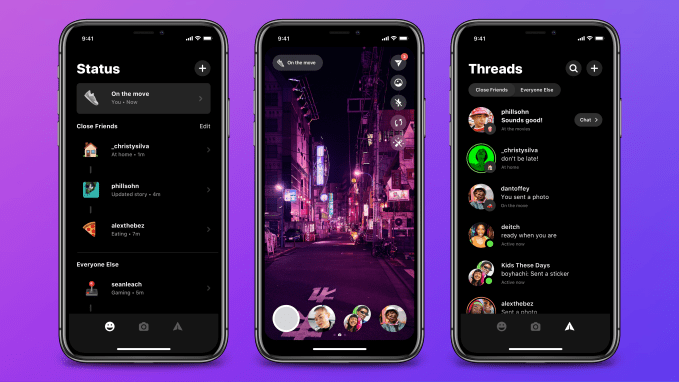
Image Credits: Instagram
Instagram’s standalone messaging app Threads is shutting down. The app will no longer be supported by the end of December 2021, TechCrunch confirmed with the company after reports of its impending closure began circulating via social media. Instagram is planning to alert its existing Threads users with an in-app notice beginning on November 23, which will direct them to return to Instagram to message their friends going forward.
Threads was introduced in 2019 as a companion app to Instagram shortly after the company shut down its other standalone messaging app, Direct. Instead of focusing solely on the inbox experience, Threads was built as a “camera-first” mobile messager designed to be used for posting status updates and staying in touch with those you designated as your “Close Friends” on Instagram. It later expanded to all users to message everyone, but failed to gain traction.
To date, Threads has seen approximately 13.7 million global installs from across the App Store and Google Play, according to estimates from app intelligence firm Sensor Tower. However, users didn’t respond well to the app once installed in many cases. The app sports a 3.1-star rating on the App Store where reviews complain about bugs, usability issues, the layout and missing features.
Instagram says shutting the app makes sense as it won’t have to split its focus between two messaging services and Threads’ features are now being delivered by Instagram’s main app.
Weekly News
Platforms: Apple
- Apple released iOS 15.1.1 which promises to solve a problem with dropped calls on iPhone 12 and 13 models.
- Code in the iOS 15.2 beta reveals the “SportsKit” framework, which is integrated with the Apple TV app, Siri and home screen widgets. The widget includes the ability to receive real-time sports score updates, but not much else is known.
- Apple was hit with another class-action lawsuit alleging the company is engaged in anti-competitive behavior by restricting users to its App Store and in-app payments. Meanwhile, Epic Games’ Tim Sweeney is now making the case for a universal app store that works across all platforms.
Platforms: Google
- Google is testing a new Play Store website. The company hasn’t updated the design of its online app store in years, but the new design is swapping out sidebar navigation for quick-access buttons at the top of the page and settings found under your profile icon, like the Play Store design for tablets.
- Google rolls out a Pixel 6 update. The update vaguely promises minor bug fixes and performance improvements for the fingerprint sensor performance on Pixel 6 and 6 Pro devices. Users of Google’s new flagship devices have complained the sensor is sometimes slow to recognize their fingerprint.
Platforms: Amazon
- Amazon launched the newest version of its in-app purchasing SDK, the Appstore SDK, which allows developers to offer digital content and subscriptions for purchase.
E-commerce
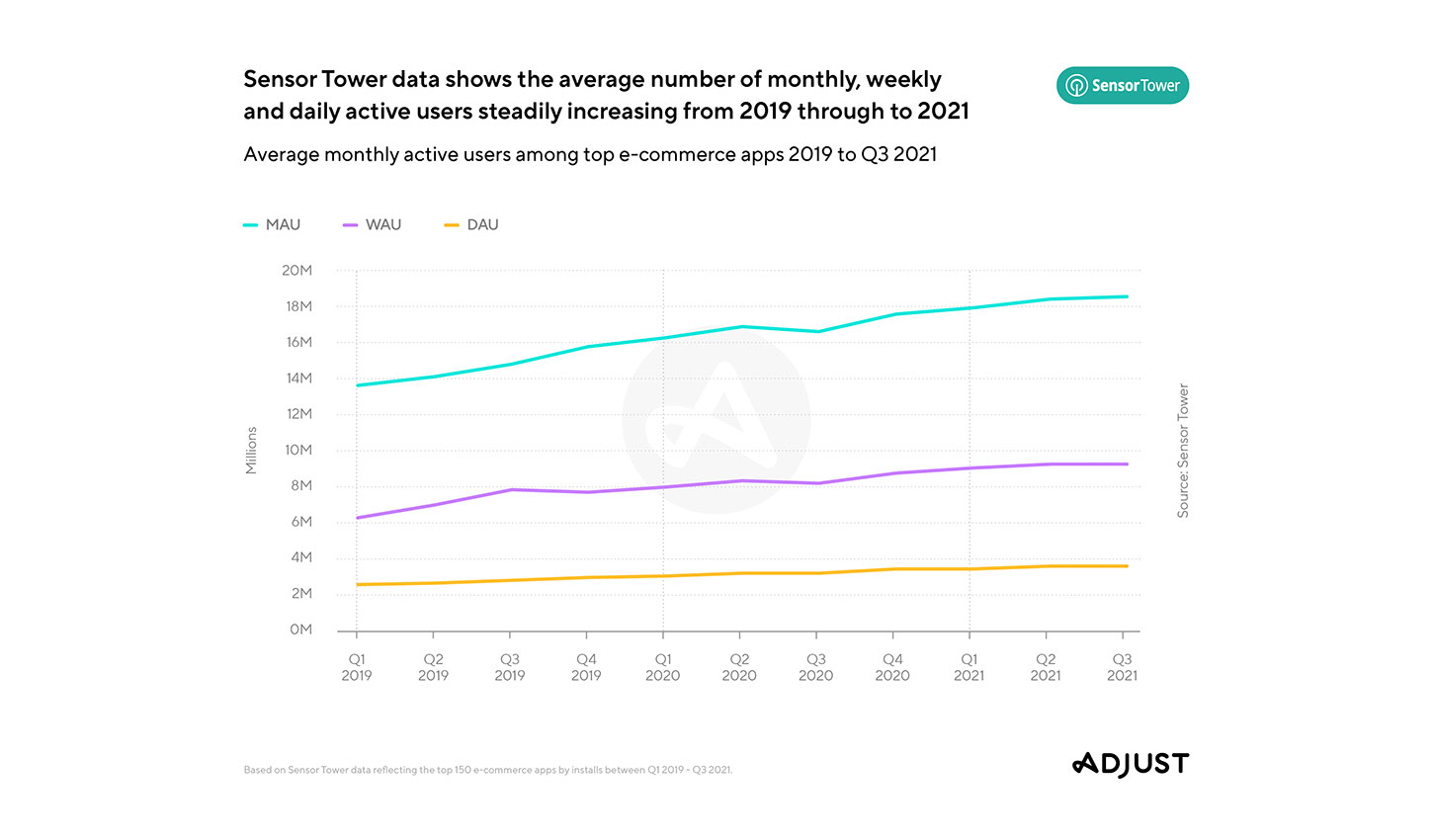
Image Credits: Sensor Tower and Adjust
- Shopping app installs increased 10% year-over-year, according to a new report from Sensor Tower and Adjust. Average MAUs for the top 150 e-commerce apps globally were approximately 18 million in Q3 2021, up from 14 million in Q3 2019. India, Indonesia and Mexico led in downloads of e-commerce apps, while U.S. downloads slowed. In the first three quarters of 2021, India saw 470 million shopping app downloads, up 49% YoY. But U.S. downloads were 218 million, a decrease of 16% YoY.
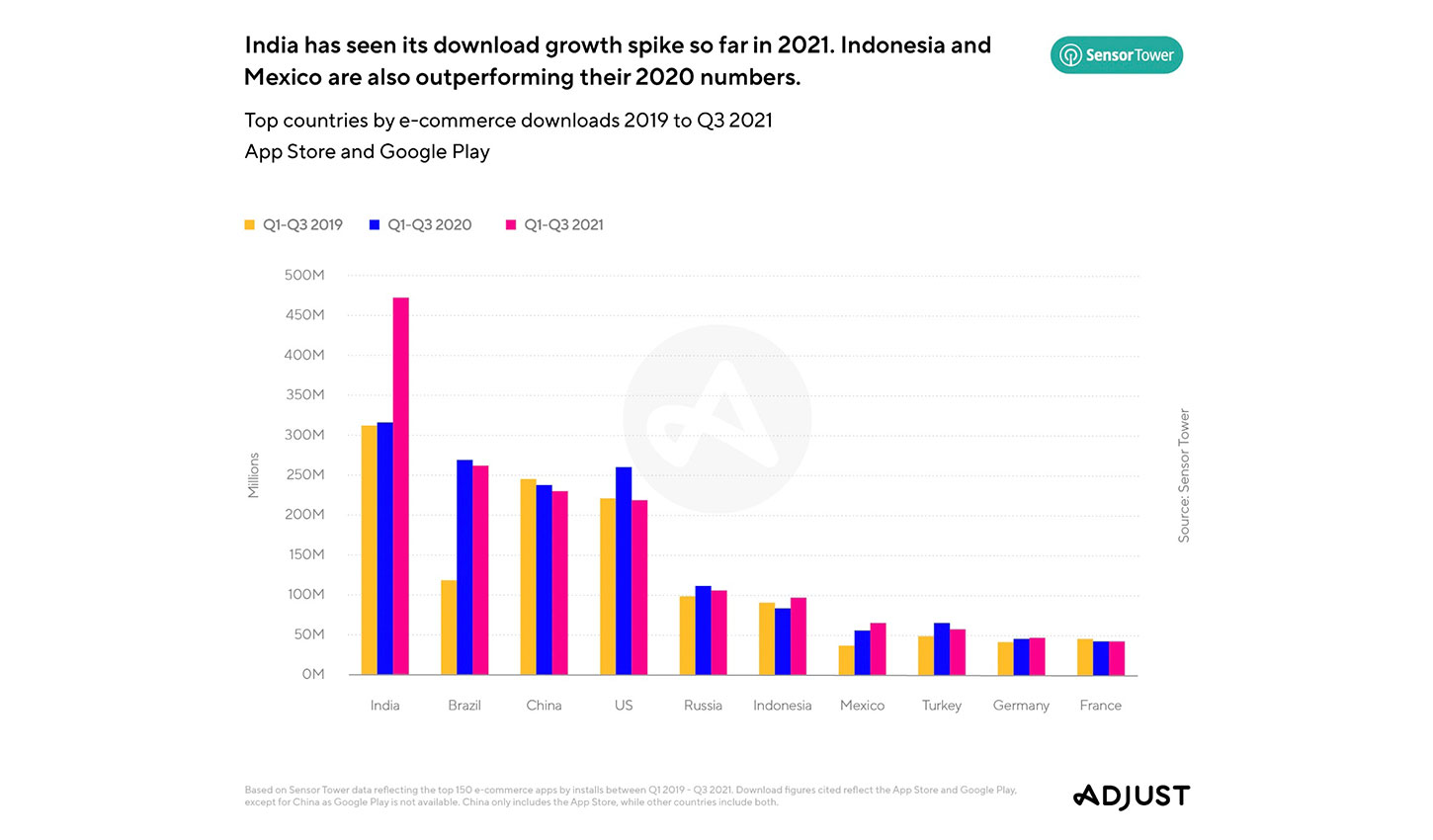
Image Credits: Sensor Tower and Adjust
- Google Maps expands online grocery tracking. The feature was first launched with Fred Meyers in Portland, but now supports more Kroger Family stores like Kroger, Fry’s, Ralphs and Mariano’s. In total, online grocery ordering is available in Maps across 2,000 locations in 30 U.S. states. The app allows users to track orders placed with the retailer and share your ETA with the store for your order pickup.
- Square launched the Square Photo App, which makes it easy for sellers to take high-quality photos from a mobile device and then sync them directly to their Square item catalog or online store. The app can isolate the product from the background so sellers can add new backgrounds, colors and shadows.
Augmented Reality
- Pokémon GO maker Niantic has hired its first Global Director of Trust & Safety — an increasingly common position found at companies offering social and gaming apps. Camille Francois, who joins from Graphika, will be responsible for ensuring Niantic builds responsibly, inclusively and with respect to user privacy, while considering the impacts from AR technology development now — not after the fact.
- Snapchat this week announced a deal with Sony Music for new AR music lenses, called “Sound Lenses.” These will contain a pre-selected song embedded in the lens and will make it appear as if the user is singing the song. Cameo Sound Lenses will also apply other visual effects.
- A new app uses AR to tell Anne Frank’s story. The app, The Bookcase for Tolerance, lets users step inside a 3D model of the rooms Anne Frank, and four young people facing discrimination today — Kuei, Mees, Dalit and Majd. In the app, you can explore their personal objects in their rooms in AR and listen to their stories.
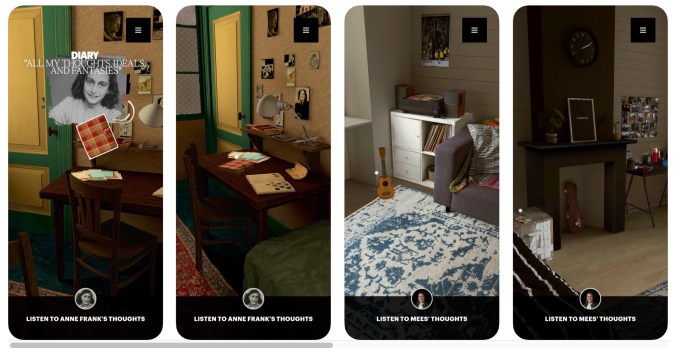
Image Credits: Anne Frank Foundation
Fintech
- A U.S. judge dismissed the lawsuit against trading app Robinhood, which accused the company of colluding with Citadel Securities to stop investors from buying meme stocks, like GameStop and others, back in January. The ruling says there wasn’t enough evidence presented to prove this was the case.
- Neobank app downloads topped 264 million from Q4 2020 to Q3 2021, according to App Annie. Brazil and Latin American are ripe for growth, with Brazil’s Nubank the most downloaded app in the country. Neobanks targeting teens are also gaining traction. Also during the same period, 29% of neobank downloads in the U.S. were those that targeted teens.
- Fintech startup Jiko partnered with technology tools maker Euphoria to launch a banking app, Bliss, for the transgender community in the U.S. 34% of the 2-6 million people in the U.S. who identify as transgender lack identification that matches their gender, making it harder to access banking products.
Social
- Instagram rolled out new features, including a long-awaited option to allow users to delete individual photos from a carousel post. The company also introduced a feedback feature that lets you shake your phone to report a problem.
- TikTok struck its first music licensing deal with the Australasian Performing Right Association and Australasian Mechanical Copyright Owners Society (APRA AMCOS).
- Snapchat launched Memories and Explore Layers on its Snap Map. The former allows users to see old Snapchats posted from various places and the latter updates the heat map to include layers from partners like Ticketmaster and The Infatuation which show where nearby events are happening or popular restaurants.
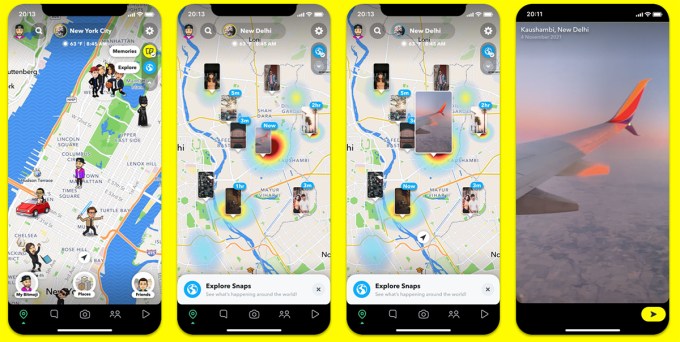
Image Credits: Snapchat
- TikTok’s app ecosystem — meaning the 400 or so third-party apps that offer things like the ability to download videos, view analytics, track hashtags, increase follower counts and more — has now reached over 3 billion downloads worldwide, reports Sensor Tower. Meanwhile, TikTok (including sister app Douyin) has 3.3 billion installs.
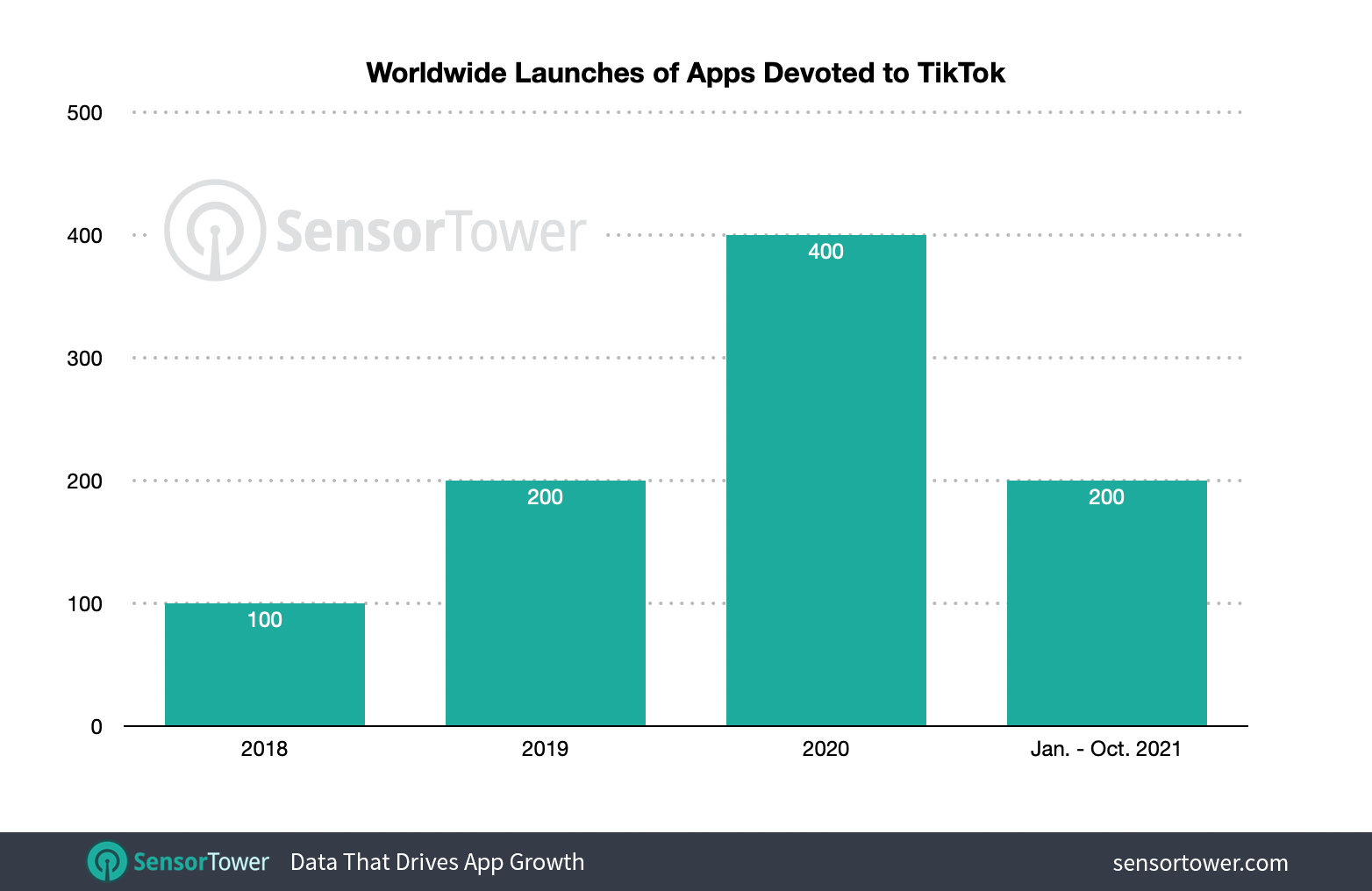
Image Credits: Sensor Tower
- TikTok updated its Safety Center resources after commissioning research on teens’ interest in harmful viral challenges. The research offered a lot of data and insights into how teens’ minds work and what can be done, but TikTok’s response is fairly minimal — it added resources and changed some language on prompts that appear.
- Pinterest launched its own in-house incubator for new projects, TwoTwenty, to fuel more rapid experimentation at the company as it attempts to shift to support video and creators. The team already introduced live shopping via Pinterest TV and a virtual creator studio.
- Facebook will begin testing its Nextdoor competitor, Facebook Neighborhoods, in 132 U.S. cities. The feature had been tested in parts of Canada since last year.
- Twitter is phasing out support for AMP on iOS and Android. The company quietly dropped support for Accelerated Mobile Pages (AMP), saying the feature, which offers fast-loading pages, will be retired by year-end. AMP has proven controversial as a movement headed by Google, as some saw it as an attempt to take over the open web.
Photos
- Waldo brings its ad-free, private photo-sharing service direct to consumers. The company had been focused for several years on B2B deals with schools, camps, events and other organizations, but is now expanding to include B2C features on a subscription basis. Its storage plans are pricier than Google Photos or Apple’s iCloud but include closed-loop commenting and reactions that allow people to have private interactions that are only seen between the photo owner and commenter, and not others in the shared album.
Messaging
- WhatsApp rolled out new profile privacy controls to some of its iOS beta testers via TestFlight. The controls give users more granular control over different aspects of their profile, including when they were “last seen,” their photo, and the “about” section. It’s unclear when the feature will arrive to the public.
Streaming & Entertainment
- Clubhouse finally adds live captions on iOS. The streaming app is catching up with competitors, like Twitter Spaces, by adding support for live captions — an accessibility feature that allows those who are deaf or hard of hearing to participate in audio apps. The company currently supports 13 languages and says more are on the way. The update follows the app’s recently added support for asynchronous listening and recorded rooms.
- Some of Facebook’s $1 billion creator fund is being put toward its audio efforts, reports The Information. The social network is paying creators up to $50,000 to use its Clubhouse rival, Live Audio Rooms, the report claimed.
Gaming
- U.S. mobile strategy game spending increased 24% year-over-year to reach $4.2 billion, said Sensor Tower. The top Strategy genre game by player spending in the U.S. between November 1, 2020 and October 31, 2021 was Lords Mobile from IGG, which generated $330.3 million. The No. 2 grossing Strategy title was Clash of Clans from Supercell, followed by State of Survival from FunPlus.
Utilities
- The Google Maps app was updated with an “area busyness” feature that shows users in real time which parts of town are crowded and busy. The feature could help people better plan their holiday activities to either avoid the crowds or join the party, depending on their preference. The feature will roll out to iOS and Android. The app also added more data for malls, airports and transit stations, including stores inside airports, car rentals, parking lots and more.
Health & Fitness
- Google Assistant will soon help users in India book vaccination appointments. The option will roll out in 2022 and will support English, Hindi and other local languages such as Gujarati, Kannada, Malayalam, Bengali, Marathi, Tamil and Telugu.
Travel & Transportation
- Southeast Asian ride-hailing and delivery app Grab experienced a multi-day outage impacting users in Singapore, Malaysia and the Philippines. The company said an issue with a planned system upgrade had caused the disruptions. While core services were restored after a day, the app continued to have intermittent problems the following day.
Government & Policy
- Apple and Google were questioned by the U.K.’s data protection watchdog over app age ratings after the digital safety charity 5Rights Foundation raised concerns about non-compliance with the U.K.’s Age Appropriate Design Code. The group says it found 12 breaches of the Code, including insufficient age checks, mis-advertised minimum ages for games, the use of dark patterns and nudges, data-driven recommendations that create risks for children, a routine failure to enforce community standards, low default privacy settings and more.
Funding and M&A
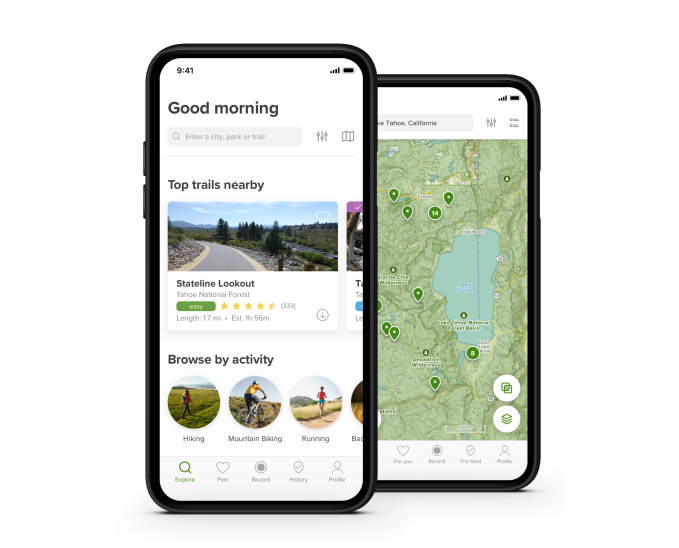
Image Credits: AllTrails
 AllTrails, the app for hikers and outdoor enthusiasts, raised $150 million from Permira to expand its app internationally and further develop its product. The company benefitted from a COVID-driven boost in reconnecting with nature and now has more than 40 million installs and more than 1 million paid subscribers.
AllTrails, the app for hikers and outdoor enthusiasts, raised $150 million from Permira to expand its app internationally and further develop its product. The company benefitted from a COVID-driven boost in reconnecting with nature and now has more than 40 million installs and more than 1 million paid subscribers.
 Medium acquired audio-learning app Knowable to bring audio capabilities to its readers, members and creators. Knowable over the past two years created a library of audio lessons from experts. Its founders will stay on at Medium to lead the company’s audio plans. Deal terms were not disclosed.
Medium acquired audio-learning app Knowable to bring audio capabilities to its readers, members and creators. Knowable over the past two years created a library of audio lessons from experts. Its founders will stay on at Medium to lead the company’s audio plans. Deal terms were not disclosed.
 Twitter acquired the app Threader, which helped people compile their favorite Twitter threads and share them with others. Users would reply to a thread on Twitter by tagging Threader’s profile and then writing the word “compile.” The bot would then create a link that presents the thread in an easier-to-read format. The company says subscribers on iOS will have to request their refunds from Apple, as it’s not able to manage its own subscriptions.
Twitter acquired the app Threader, which helped people compile their favorite Twitter threads and share them with others. Users would reply to a thread on Twitter by tagging Threader’s profile and then writing the word “compile.” The bot would then create a link that presents the thread in an easier-to-read format. The company says subscribers on iOS will have to request their refunds from Apple, as it’s not able to manage its own subscriptions.
 Singapore-based Deskimo, an on-demand desk booking app for coworking spaces, raised $3 million in seed funding. Participants in the round included Y Combinator (Deskimo was part of its summer 2021 cohort), Global Founders Capital, Pioneer Fund, Seed X, Starling Ventures and TSVC. The app also launched in Jakarta, in addition to existing markets Singapore and Hong Kong.
Singapore-based Deskimo, an on-demand desk booking app for coworking spaces, raised $3 million in seed funding. Participants in the round included Y Combinator (Deskimo was part of its summer 2021 cohort), Global Founders Capital, Pioneer Fund, Seed X, Starling Ventures and TSVC. The app also launched in Jakarta, in addition to existing markets Singapore and Hong Kong.
 Fintech app UNest raised $26 million in Series B funding led by The Artemis Fund. The app provides financial planning tools for parents saving on behalf of their children and counts 400,000 users.
Fintech app UNest raised $26 million in Series B funding led by The Artemis Fund. The app provides financial planning tools for parents saving on behalf of their children and counts 400,000 users.
 Social audio app Walkie-talkie raised $3.25 million in seed funding led by Heroic Ventures. The Clubhouse-like app lets users host either public or private rooms (called “frequencies”) which are accessed through a scanning feature like radio offers. The app has 1.2 million active users.
Social audio app Walkie-talkie raised $3.25 million in seed funding led by Heroic Ventures. The Clubhouse-like app lets users host either public or private rooms (called “frequencies”) which are accessed through a scanning feature like radio offers. The app has 1.2 million active users.
 Gift-giving app Goody raised $15 million in what it’s calling “step-up” funding (not a full Series B) from SoftBank’s Latin America fund. The Miami-based company has raised $32 million to date from NEA, Index and others to offer a selection of curated gifts for both corporate gift-giving and consumers.
Gift-giving app Goody raised $15 million in what it’s calling “step-up” funding (not a full Series B) from SoftBank’s Latin America fund. The Miami-based company has raised $32 million to date from NEA, Index and others to offer a selection of curated gifts for both corporate gift-giving and consumers.
 Runway, a software platform that describes itself as “air traffic control” for mobile app releases, raised $2 million in seed funding led by Bedrock Capital, and launched out of beta. The system integrates with a company’s existing tools, like GitHub, JIRA, Trello, Bitrise, CircleCI and others, to automatically update teams as to what’s been done and what action items still remain, and helps everyone stay on the same page across teams.
Runway, a software platform that describes itself as “air traffic control” for mobile app releases, raised $2 million in seed funding led by Bedrock Capital, and launched out of beta. The system integrates with a company’s existing tools, like GitHub, JIRA, Trello, Bitrise, CircleCI and others, to automatically update teams as to what’s been done and what action items still remain, and helps everyone stay on the same page across teams.
 Social impact app Wishly raised $800,000 in seed funding for its platform that helps people band together to enact positive change in the world through nonprofit donations. The app allows users to follow and message each other, learn about different charities and more. Nonprofits can also use the app to harness microdonations and spread awareness.
Social impact app Wishly raised $800,000 in seed funding for its platform that helps people band together to enact positive change in the world through nonprofit donations. The app allows users to follow and message each other, learn about different charities and more. Nonprofits can also use the app to harness microdonations and spread awareness.
 Mark Cuban-backed creator platform Fireside is closing a “seed+” round of close to $10 million, TechCrunch sources said. The round includes investors such as The Chainsmokers, HBSE, Goodwater, Animal Capital and NFL stars Larry Fitzgerald and Kelvin Beachum and former NBA star Baron Davis.
Mark Cuban-backed creator platform Fireside is closing a “seed+” round of close to $10 million, TechCrunch sources said. The round includes investors such as The Chainsmokers, HBSE, Goodwater, Animal Capital and NFL stars Larry Fitzgerald and Kelvin Beachum and former NBA star Baron Davis.
Downloads
Racket
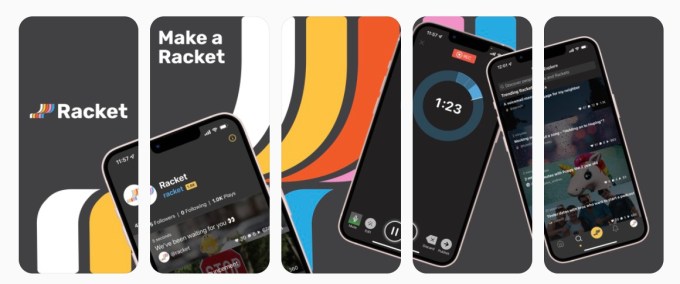
Image Credits: Racket
Newly launched audio app Racket allows users to tell audio stories, similar, to some extent, with Facebook’s Soundbites or the friends-focused audio app Cappuccino. Racket’s app provides a TikTok-like vertical feed with audio snippets of 99 seconds or less. Each page features a cover image, tags, a like button (a heart) and a comments section, which will be familiar to the TikTok crowd. Users can also search by tags or just go to the main feed to hear a broader variety of clips. The company also announced $3 million in pre-seed funding from Greycroft, Foundation Capital and LightShed Ventures, as well as angel investors.
Audyo
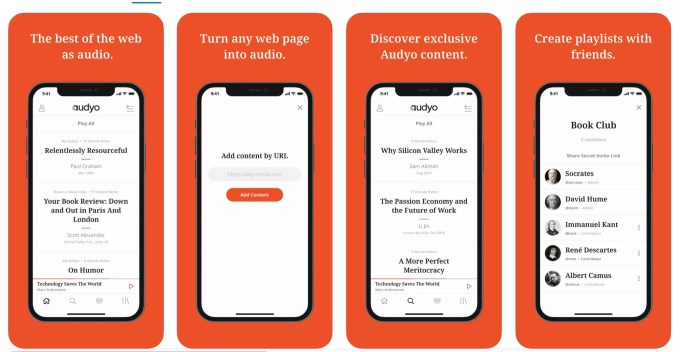
Image Credits: Audyo
iOS audio app Audyo exited private beta this week to offer users a way to convert web pages into high-quality audio. The idea is to give users an easy tool for saving content from around the web, like news articles, and combine that with other audio content you may already be listening to — like Audible audiobooks and podcasts (neither of which is yet available, however). But the app isn’t only meant to serve as a utility — there’s a social component as well. Users will be able to share their listens with friends, discover community playlists and, highlight favorite content (including by double tapping the screen or triple-tapping your AirPods).
Macro+
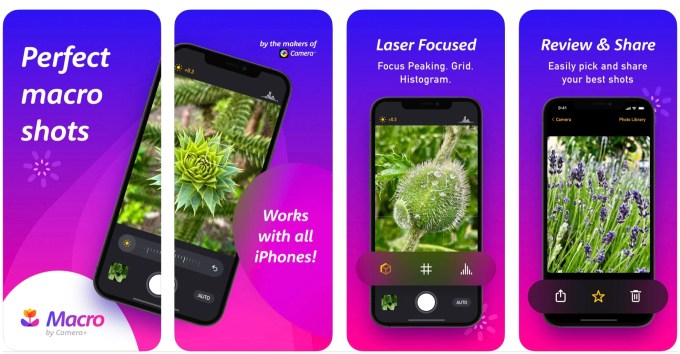
Image Credits: LateNiteSoft S.L.
A new app from the makers of Camera+, Macro+, is designed to capitalize consumer interest in up-close photos following the new iPhone’s support for Macro photography. However, this app is designed to work on any iPhone capable of running iOS 15, the developer says — which means it’s not just for those with the latest hardware. Instead, the app helps by outlining the parts of the photo that are in focus, providing a grid for positioning the subject, and it offers a histogram to visualize the brightness of your shot. After snapping the photo, Macro+ will intelligently edit the photos to make subjects look crisp, even if you’re not a skilled photographer. The Camera+ app includes a similar Macro tool, but the new app is meant for those who want more of a single-purpose tool for their up-close photos or who feel overwhelmed by more professional camera apps and their many options.

Source : This Week in Apps: Apple defends app ad buying, Spotify gains lyrics, Instagram kills Threads













